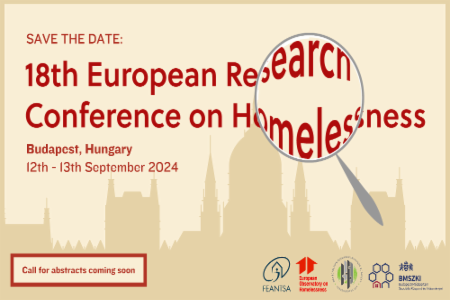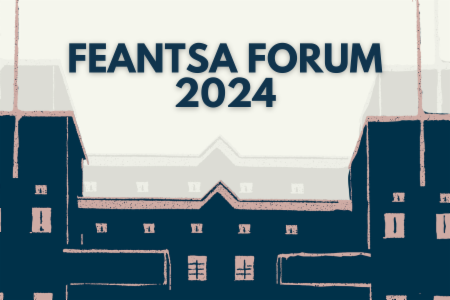Ten Facts You Need to Know About Homelessness and Human Rights
Download the PDF document here
10 December 2023 marks the 75th anniversary of the Universal Declaration of Human Rights
|
Article 25 Universal Declaration of Human Rights: Everyone has the right to a standard of living adequate for the health and well-being of himself and of his family, including food, clothing, housing and medical care and necessary social services(…) |
FEANTSA and its members understand homelessness as a situation that deprives individuals of fundamental rights, including the right to adequate housing.
1. Homelessness definition
FEANTSA developed a European Typology of Homelessness and housing exclusion (ETHOS) as a means of improving understanding and measurement of homelessness in Europe. ETHOS identifies 4 main categories of living situations: rooflessness, houselessness, insecure housing and inadequate housing. Despite monitoring propositions, limited data on the true extent of homelessness hinders the development of effective strategies and policies to address the issue.
2. Homelessness is a violation of human rights
Homelessness violates fundamental human rights such as dignity, the right to life, and the right to an adequate standard of living, which includes access to housing, food, and clothing. Furthermore, it is connected to other infringements, impacting the right to health, the right to water and sanitation, the right to privacy, employment, social security, and education. It impacts as well the prohibition of cruel, degrading, and inhuman treatment.
3. Homeless people are right holders
Homeless people are right holders and therefore empowered to claim their rights, in line with the rights-based approach. Formal mechanisms should be established to ensure the participation of the homeless people in the design and implementation of measures addressed to them. A policy or programme that is formulated without the active and informed participation of those affected is most unlikely to be effective. Explore participation opportunities for those facing inequality, exclusion, and homelessness with our toolkit for service-providing organisations.
4. Right to adequate housing and right to shelter
States must take certain steps to realise the right to adequate housing immediately, and priority must be given to those social groups living in unfavourable conditions. Living in a street situation or having no access to adequate housing at all, means living in one of the most unfavourable conditions. Preventing and eliminating homelessness is a “minimum core obligation” of states to ensure the satisfaction of the right to housing.
5. Homeless Bill of Rights
Homeless individuals sleeping on the streets are among the most vulnerable groups in society, and are disproportionately exposed to violence, hunger, and harsh weather conditions that can result in serious health issues and even death. The Homeless Bill of Rights is a compilation of basic rights drawn from European and International human rights law but specifically tailored to the situation of homeless people.
6. Ending the criminalisation of persons in a situation of homelessness
Homeless individuals often face criminal charges related to their circumstances, such as sleeping in public or trespassing, further compounding and limiting their movement and daily activities, many of which are simply methods to survive.
The criminalisation of rough sleepers, be it through legislative means, displacement to city outskirts or into camps before mega-events such as the Olympics, public space infrastructure or hostile architecture that prevents homeless people from sleeping or resting, or restrictions on using public facilities such as toilets, is a concerning global trend. Multiple human rights mechanisms have condemned these practices, and called for their prohibition.
7. Access to Justice
Measures should be put in place to enhance access to justice for those at risk of homelessness or already experiencing homelessness.
The right to housing should be claimable and enshrined in national law, with effective judicial and non-judicial avenues in place.
8. Monitoring
States should be encouraged to collect data on the nature and extent of homelessness, considering various demographic factors to embed interventions in national contexts and to allow for adaptations and the monitoring of progress.
Administrative obstacles, for example registration and address requirements, which can prove difficult for homeless persons, can also prevent individuals from accessing rights and benefits. Measuring the extent of these barriers can help shape policies to address these obstacles. Find out more about data collection systems and homelessness in the EU.
9. Advocacy and litigation
FEANTSA and its members engage in the protection of the rights of the homeless primarily through transnational exchanges, direct advocacy and research.
FEANTSA intends to influence national law and practices in Europe that are not in line with international human rights standards by supporting strategic litigation. FEANTSA has engaged in litigation to defend the rights of the homeless through the Collective Complaint mechanism. Learn more about our Collective Complaints here.
10. Leave no one behind: SDGs and the New Urban Agenda
The Sustainable Development Goals (SDGs) and the commitments undertaken by EU Member States in the New Urban Agenda have the potential to address housing issues and homelessness from a human rights perspective. Specifically, Goals 1 (combating poverty), 3 (health), 10 (reducing inequalities), and 11 (safe, inclusive and resilient cities) and their corresponding targets are particularly important in efforts to realise the human rights of people in homeless situations.





